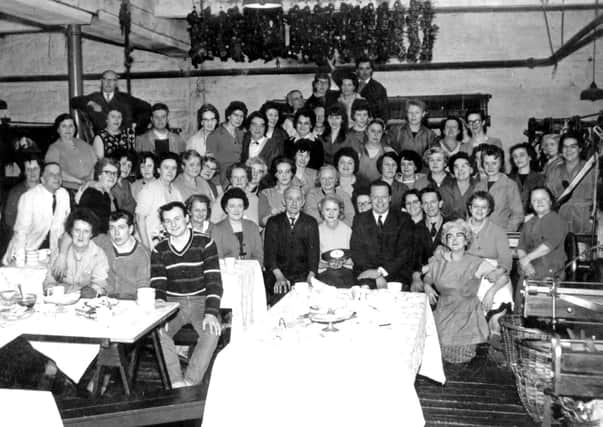Heart-warming stories of much happier times


But we can do much to direct our thoughts to happier times which we know will come, and also the happier times which have been.
Remembering old friends and workmates and the camaraderie which existed in the places where we worked, can be heart-warming.
Advertisement
Hide AdAdvertisement
Hide AdFor during my 60 years in journalism I have written many such stories of those who worked in local mills.


About 20 years ago I wrote about Dorothy Wilson, and the happy years she worked at Crabtree’s Mill in Dewsbury Moor during the 1950s and 60s.
Dorothy would later emigrate to Adelaide in Australia in 1971 with husband Joe and children, Lynn and David, but she never forgot her hometown of Dewsbury.
Brought up in Savile Town, Dorothy’s maiden name was Beal, and her first job at 14 was at Waddington and Ledger’s Printers behind the old Empire Theatre.
Advertisement
Hide AdAdvertisement
Hide AdAfter a year there, she asked her dad if she could leave and go to work in the mill with a neighbour, Mary Burns, who was later to marry her brother.
Her dad finally agreed but only after a neighbour, Mrs Cross, who worked at the mill with some of her daughters, persuaded him.
Dorothy told me: “From the day I started at Crabtree’s, my life changed.
“I was so happy there I used to look forward to going every day.”
Advertisement
Hide AdAdvertisement
Hide AdHer sister Margaret followed, and later so did another sister Shirley, and in 1953 their boss paid for the entire mill to go to the Festival of Britain in London.
“He also treated us every year to a day at the seaside and gave us ten shillings each to spend, as well as providing a meal for us,” recalled Dorothy.
“I really looked forward to those trips and we sang all the way there and all the way back. It was a great day out.”
She recalled other happy memories including the day she and some workmates heard the ‘Squadronaires’ dance band was playing in Huddersfield.
Advertisement
Hide AdAdvertisement
Hide Ad“Word got round the mill and about ten of us decided to go. Some of us washed our hair in the canteen that afternoon in preparation.
“We put our rollers in and covered them with a turban, and at “knocking off” time, we all dashed home to get ready.
“We met up at Wellington Road Station and when we got there we danced all night long and nearly missed the train home.
“We didn’t arrive at Dewsbury until the early hours, but in spite of our late and hectic night, we all turned up for work next morning on time.”
Advertisement
Hide AdAdvertisement
Hide Ad“When it snowed in winter we had lots of fun having snowball fights with the men who had a separate canteen from the women.
“We would wait for them coming out with a pile of snowballs ready and we always got the better of them because we were younger and could run faster.
“But in spite of all the fun we had, everyone worked hard to keep their looms going. We were on piece work and were all keen to earn decent wages.
“The worst things I remember were those Monday mornings during the cold winter months when we had to oil our machines before we could get started.
Advertisement
Hide AdAdvertisement
Hide Ad“Me and my sister Mary left home before 6.30am to walk to the bus station to catch our bus, and often we had to stand all the way because buses in those days were always full.
“It was always colder in the mill on Monday because it had been shut up for the weekend and there was no heating on.
“Everything we touched was so cold we had to oil all around the looms before we could start working.
“We weren’t supposed to, but some of us would change our shuttles while the looms were still going, and because it was so cold we sometimes let go of them.
Advertisement
Hide AdAdvertisement
Hide Ad“This would cause a ‘trap’ bringing down all the threads which had taken us hours to prepare – but there were always plenty of helpers to give us a hand, even the tuners helped.
“I worked at Crabtree’s from the age of 15 to 25 and I can honestly say they were the best working years of my life. We had so much fun and everyone was so friendly.”
Dorothy, who was brought up in Savile Town and also lived there after her marriage, remembered vividly the night during the war when the houses in North View, Savile Town, were bombed.
“I was 10 years old and Brenda Hartley, whose house was bombed, was in my class at school and a good friend.
Advertisement
Hide AdAdvertisement
Hide Ad“I can still remember the names of those who were killed and injured.
“Later when I married my husband, Joe, we went to live in South View, Savile Town, and our backyard looked onto the empty bombed site.
“Our children used to ask us why there weren’t any houses there and I would tell them what had happened.”
○I hope to publish other stories like Dorothy’s which I hope will lighten the heart because they recall the simple, uncomplaining lives ordinary people, lived, even during war time.
Please email your fond memories of Dewsbury to [email protected].